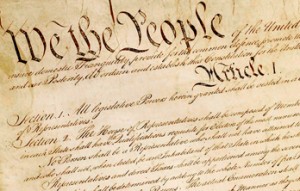Our First Amendment in Danger by SB821

OUR FIRST AMENDMENT IS IN DANGER BY SB821.
WE MUST STOP THIS IN COMMITTEE! It’s coming up in the House State Agencies & Governmental Affairs Committee tomorrow (Friday, April 12, 2013).
SB821 – AN ACT CONCERNING INITIATIVES AND REFERENDUMS; TO REQUIRE PAID CANVASSERS OF INITIATIVE AND REFERENDUM PETITIONS TO REGISTER WITH THE SECRETARY OF STATE BEFORE CANVASSING; TO REQUIRE NOTICE TO THE STATE POLICE OR TO COUNTY PROSECUTING ATTORNEYS OF SUSPECTED FORGERY OF SIGNATURES ON PETITIONS; TO REQUIRE SPONSORS OF STATEWIDE PETITIONS TO ASSUME THE BURDEN OF DEFENDING THE SUFFICIENCY OF POPULAR NAMES AND BALLOT TITLES IN JUDICIAL PROCEEDINGS; TO REGULATE THE COUNTING OF SIGNATURES ON INITIATIVE AND REFERENDUM PETITIONS; TO REPEAL PROVISIONS OF ARKANSAS LAW PROVIDING FOR REVIEW OF THE LEGAL SUFFICIENCY OF STATEWIDE INITIATIVE PETITIONS AND BALLOT TITLES BEFORE COMPLETED PETITIONS ARE FILED; TO DECLARE AN EMERGENCY; AND FOR OTHER PURPOSES.
It’s important that we STOP this in committee. SB 821 will make it much tougher to petition an issue onto the ballot, and it’s already difficult enough. While our state officials are claiming massive fraud in the petition process, they have not prosecuted a single person. Not one.
Instead, they want to make it tougher for grassroots activists like us.
According to Paul Jacob’s article (at the bottom of this email):
“If passed into law, this bill would create a cumbersome and expensive new government program for
registration, training, and tracking citizens who are paid to circulate petitions to place initiatives and
referendums on the ballot.”
Senate Bill 821 is bad because it:
1. Creates a huge new state bureaucracy registering, training and tracking paid petition circulators, and
2. Sets numerous criteria for throwing out otherwise valid petition signatures of Arkansas voters because of any
technical error innocently made by a petitioner, notary public or campaign official, and
3. Unconstitutionally bans paying petition circulators based on their productivity in gathering signatures, which means
the efficiency of a petition drive will go down and the cost of a petition drive will increase 50%, double or even higher.
We need your help to stop this bill. Calls and emails to the members of the House Committee on State Agencies and Governmental Affairs are needed tonight and tomorrow. Their contact information is below. Make sure they know that you don’t want more bureaucracy when it comes to gathering petitions. Vote NO on SB821. Our First Amendment rights need to be protected!
Then, be sure to read the article written by Paul Jacob and submitted to Secure Arkansas regarding the affect SB821 will have on our First Amendment – at the end of this email.
House Committee on State Agencies & Governmental Affairs contact info:
Also: you may call 501-682-6211 to leave an urgent message for Representatives (while in session).
* * * * * * * * * * *
If passed into law, this bill would create a cumbersome and expensive new government program for registration, training, and tracking citizens who are paid to circulate petitions to place initiatives and referendums on the ballot. SB 821, sponsored by state Senator Keith Ingram, would place extremely heavy burdens on Arkansas’s initiative and referendum process – indeed, the bill almost seems designed to make it difficult or impossible for citizens to run successful ballot campaigns.
Sen. Ingram’s desire to address fraud and forgery in the 2012 petition process is commendable, but the most effective way to reduce the likelihood of lawbreaking is to prosecute those who break the law. (Although observers alleged fraud by petitioners during the 2012 elections, nobody was ever charged.) Instead, SB 821 proposes an extensive new state regulatory system – a relatively ineffective, but very expensive, way to deter criminal activity.
SB 821 would make it much more difficult for citizens to put issues on the ballot. The bill calls for the Secretary of State to begin registering, training, and tracking paid petition circulators. That is a burdensome regulation of the fundamental First Amendment right to petition.
SB 821 creates a system similar to the one Missouri has now – but our neighbor to the north appears to have learned from experience, and is now in the process of scrapping it in exchange for one more like the one Arkansas has today (that is, one without SB 821). Missouri House Bill 117, which has already passed the state’s House with only three dissenting votes, will end the program in which paid circulators had to register with the Missouri Secretary of State before gathering signatures. Missouri is moving to adopt a system in which all pertinent information about a paid canvasser is divulged and notarized on every single petition form.
Regrettably, the main impact of SB 821 is to provide expansive and unprecedented ways for the petition signatures of Arkansas voters to be thrown out. Your signature on a petition should count, just as your vote at the ballot box should count. But under SB 821, your signature can be tossed if the person circulating the petition or a notary public or anyone else handling the petition makes even the smallest technical mistake. For instance, suppose a signature-gatherer collects 20 signatures, and believes that all the signers reside in Pulaski County. If it turns out that one of the signers lives (for instance) in the unincorporated part of Saline County just across the border, then (under the new rules of SB 821) all 20 validly registered voters will have their signatures thrown out.
Paul Spencer, chair of the group Regnat Populus, which sought to place an ethics initiative on the ballot, worries that passing SB 821 would be “making legislation originating from the people of Arkansas next to impossible.”
Finally, SB 821 is likely to be the subject of litigation, because it will cost the sponsors of initiatives and referendums more while intruding on basic First Amendment protections. [Previously], it was amended to add a ban on productivity pay for people circulating petitions, making it a crime to compensate a person based on how hard she works – that is, how many signatures she gathers. A ban on productivity pay will undoubtedly result in less productivity. What public interest is there in less productive petition efforts by citizens?
There is no evidence that paying petition circulators “related to the number of signatures obtained” causes increased fraud. In fact, studies from the Citizens in Charge Foundation show that states which ban productivity pay have seen more cases of verified fraud on average than states such as Arkansas. The serious burdens SB 821 places on the people’s initiative rights create fertile ground for litigation, because (just for instance) SB 821’s new regulations prevent a person from circulating a petition for five days while the state approves his paperwork. A regulatory scheme that imposes such delays and limits on fundamental First Amendment activity is likely to be unconstitutional.
In short, Senate Bill 821 would weaken our citizens’ rights to self-government. It would burden our state’s initiative and referendum process by significantly increasing the difficulty and the cost of proposing a ballot initiative or referendum in Arkansas. Furthermore, because several of its provisions present a non-negligible risk of violating First Amendment principles of free speech, free association, and the right to petition, SB 821 could generate costly legal bills for taxpayers and embarrassing courtroom defeats.
Paul Jacob, a resident of Arkansas for the first several decades of his life, is President of the Citizens in Charge Foundation, a public interest organization which protects the initiative and referendum process. In 2007, after Jacob worked with signature collectorsin Oklahoma, he was indicted on a charge of conspiracy to defraud the state of Oklahoma, based on groundless accusations that he had violated state rules. After Jacob spent two years in legal jeopardy, without the attorney general ever seeking to have a judge determine if enough evidence existed against Jacob and others to try them, all charges were dismissed. Moreover, a central part of Oklahoma’s petition law was found unconstitutional by the Tenth Circuit Court of Appeals on grounds that it violated the First Amendment. The politicized prosecution that Jacob was forced to endure – which could have imposed a $25,000 fine and ten years in prison – should serve as a lesson to us all about the dangers of criminalizing political activity.
* * * * * * * * * * *
Securing the blessings of liberty,
Secure Arkansas
Arkansas.SecureTheRepublic.com
Information@SecureArkansas.com
